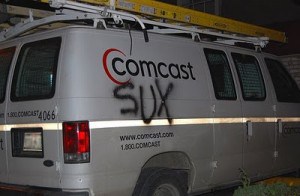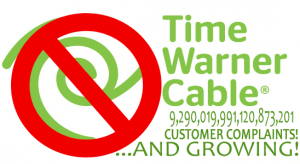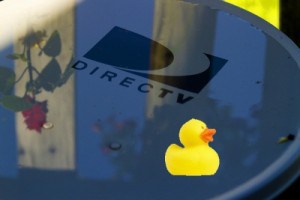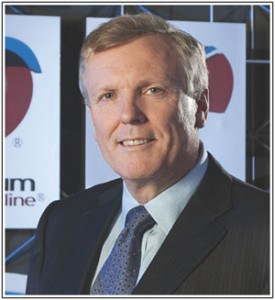
Comcast is running “welcome back” ads in Chattanooga that still claim they run America’s fastest ISP, when they don’t.
EPB, Chattanooga’s publicly-owned utility that operates the nation’s fastest gigabit broadband network, has already won the speed war, delivering consistently faster broadband service than any of its Tennessee competitors. So when facts are not on their side, competitors like Comcast and a conservative “watchdog” group simply make them up as they go along.
Comcast is running tear-jerker ads in Chattanooga featuring professional actors pretending to be ex-customers looking to own up to their “mistake” of turning their back on Comcast’s 250GB usage cap (now temporarily paroled), high prices, and questionable service.
“It turns out that the speeds I was looking for, Xfinity Internet had all along,” says the actor, before hugging an “Xfinity service technician” in the pouring rain. “But you knew that, didn’t you?”
The ad closes repeating the demonstrably false claim Comcast operates “the nation’s fastest Internet Service Provider.”
“I see those commercials on television and I’m thinking, I wonder how much did they pay you to say that,” says an actual EPB customer in a response ad from the public utility.
It turns out quite a lot. The high-priced campaign is just the latest work from professional advertising agency Goodby Silverstein & Partners of San Francisco, which is quite a distance from Tennessee. Goodby has produced Comcast ads for years. The ad campaign also targets the cable company’s other rival that consistently beats its broadband speeds — Verizon FiOS.

EPB provides municipal power, broadband, television, and telephone service for residents in Chattanooga, Tennessee
Comcast tried to ram their “welcome back” message home further in a newspaper interview with the Times Free Press, claiming “a lot of customers are coming back to Xfinity” because Comcast has a larger OnDemand library, “integrated applications and greater array of choices.”
Comcast does not provide any statistics or evidence to back up its claims, but EPB president and CEO Harold DePriest has already seen enough deception from the cable company to call the latest claims “totally false.”
In fact, DePriest notes, customers come and go from EPB just as they do with Comcast. The real story, in his view, is how many more customers arrive at EPB’s door than leave, and DePriest says they are keeping more customers than they lose.
EPB fully launched in Chattanooga in 2010, and despite Comcast and AT&T’s best customer retention efforts, EPB has signed up 37,000 customers so far, with about 20 new ones arriving every day. (Comcast still has more than 100,000 customers in the area.)
Many come for the EPB’s far superior broadband speeds, made possible on the utility’s fiber to the home network. EPB also does not use Internet Overcharging schemes like usage caps, which Charter, AT&T, and Comcast have all adopted to varying degrees. Although the utility avoids cut-rate promotional offers that its competitors hand out to new customers (EPB needs to responsibly pay off its fiber network’s construction costs), its pricing is lower than what the cable and phone companies offer at their usual prices.
 Comcast claims customers really don’t need super high speed Internet service, underlined by the fact they don’t offer it. But some businesses (including home-based entrepreneurs) do care about the fact they can grow their broadband speeds as needed with EPB’s fiber network. Large business clients receiving quotes from EPB are often shocked by how much lower the utility charges for service that AT&T and Comcast price much higher. It costs EPB next to nothing to offer higher speeds on its fiber network, designed to accommodate the speed needs of customers today and tomorrow.
Comcast claims customers really don’t need super high speed Internet service, underlined by the fact they don’t offer it. But some businesses (including home-based entrepreneurs) do care about the fact they can grow their broadband speeds as needed with EPB’s fiber network. Large business clients receiving quotes from EPB are often shocked by how much lower the utility charges for service that AT&T and Comcast price much higher. It costs EPB next to nothing to offer higher speeds on its fiber network, designed to accommodate the speed needs of customers today and tomorrow.
The competition is less able. AT&T cannot compete on its U-verse platform, which tops out shy of 30Mbps. Comcast has to move most of its analog TV channels to digital, inconveniencing customers with extra-cost set top boxes to boost speeds further.
The fact EPB built Chattanooga’s best network, designed for the present and future, seems to bother some conservative “watchdog” groups. The Beacon Center of Tennesee, a group partially funded by conservative activists like Richard Mellon Scaife through a network of umbrella organizations, considers the entire fiber project a giant waste of money. They agree with Comcast, suggesting nobody needs fast broadband speeds:
EPB also offers something called ultra high-speed Internet. Consumers have to pay more than seven times what they would pay for the traditional service — $350 a month. Right now, only residents of a select few cities worldwide (such as Hong Kong) even use this technology, and that is because most consumers will likely not demand it for another 10 years.
 Actually, residents in Hong Kong, Japan, and Korea do expect the faster broadband speeds they receive from their broadband providers. Americans have settled for what they can get (and afford). DePriest openly admits he does not expect a lot of his customers to pay $350 a month for any kind of broadband, but the gigabit-capable network proves a point — the faster speeds are available today on EPB at a fraction of price other providers would charge, if they could supply the service at all. Most EPB customers choose lower speed packages that still deliver better performance at a lower price than either Comcast or AT&T offer.
Actually, residents in Hong Kong, Japan, and Korea do expect the faster broadband speeds they receive from their broadband providers. Americans have settled for what they can get (and afford). DePriest openly admits he does not expect a lot of his customers to pay $350 a month for any kind of broadband, but the gigabit-capable network proves a point — the faster speeds are available today on EPB at a fraction of price other providers would charge, if they could supply the service at all. Most EPB customers choose lower speed packages that still deliver better performance at a lower price than either Comcast or AT&T offer.
The Beacon Center doesn’t have a lot of facts to help them make their case. But that does not stop them:
- They claim EPB’s network is paid for at taxpayer expense. It is not.
- They quote an “academic study” that claims 75 percent of “government-run” broadband networks lose money, without disclosing the fact the study was bought and paid for by the same industry that wants to keep communities from running broadband networks. Its author, Ron Rizzuto, was inducted into the Cable TV Pioneers in 2004 for service to the cable industry. The study threw in failed Wi-Fi networks built years ago with modern fiber broadband networks to help sour readers on the concept of community broadband.
- Beacon bizarrely claims the fiber network cannot operate without a $300 million Smart Grid. (Did someone inform Verizon of this before they wasted all that money on FiOS? Who knew fiber broadband providers were also in the electricity business?)
The “watchdog” group even claims big, bad EPB is going to drive AT&T, Comcast, and Charter Cable out of business in Chattanooga (apparently they missed those Comcast/Xfinity ads with customers returning to Kabletown in droves):
Fewer and fewer private companies wish to compete against EPB, which will soon have a monopoly in the Chattanooga market, according to private Internet Service Provider David Snyder. “They have built a solution looking for a problem. It makes for great marketing, but there is no demand for this service. By the time service is needed, the private sector will have established this for pennies on the dollar.”
 Ironically, Snyder’s claim there is no demand for EPB’s service fall flat when one considers his company, VolState, has been trying to do business with EPB for two years. He needs EPB because he is having trouble affording the “pennies on the dollar” his suppliers are (not) charging.
Ironically, Snyder’s claim there is no demand for EPB’s service fall flat when one considers his company, VolState, has been trying to do business with EPB for two years. He needs EPB because he is having trouble affording the “pennies on the dollar” his suppliers are (not) charging.
Snyder tells “Nooganomics” his company wants an interconnection agreement with EPB, because the private companies he is forced to buy service from — including presumably AT&T, want to charge him a wholesale rate twice as much as EPB currently bills consumers. Snyder calls EPB’s competition “disruptive.”
Nooganomics calls EPB’s low priced service a “charity” in comparison to what AT&T and Comcast charge local residents, and the free market can do no wrong-website seems upset consumers are enjoying the benefits of lower priced service, now that the local phone company and cable operator can’t get away with charging their usual high prices any longer.
Deborah Dwyer, an EPB spokeswoman, told the website the company got into the business with state and city approval, followed the rules for obtaining capital and pays the taxes or payments-in-lieu of taxes as the same rate as corporate players. “We believe that public utilities like EPB exist to help improve the quality of life in our community, and the fiber optic network was built to do just that. One of government’s key responsibilities is to provide communities with infrastructure, and fiber to the home is a key infrastructure much like roads, sewer systems and the electric system.”
Snyder can’t dispute EPB delivers great service. He also walks away from the competition-is-good-for-the-free-market rhetoric that should allow the best company with the lowest rates to win, instead declaring customers should only do business with his company to support free market economics (?):
“If you are a free market capitalist and you believe in free markets, you need to do business with VolState,” Mr. Snyder says. “And if you’re highly principled, every time you buy from a government competitor, what you’re voting for with your dollars is, you’re saying, ‘It’s OK for the government come in to private enterprise and start to take over a vast part of what we used to operate in as a free market.’”
Perhaps Snyder and his friends at the Beacon Center have a future in the vinegar business. They certainly have experience with sour grapes.
[flv width=”640″ height=”500″]http://www.phillipdampier.com/video/Comcast Ad Welcome Back.flv[/flv]
Comcast’s emotionally charged ad, using paid actors, was produced by advertising firm Goodby Silverstein & Partners. The commercial running in Chattanooga is a slight variation on this one, which targets Verizon FiOS. (1 minute)
[flv width=”640″ height=”500″]http://www.phillipdampier.com/video/EPB Ad.flv[/flv]
EPB uses actual customers, not paid actors, in its own advertising that calls out Comcast’s false advertising. (1 minute)
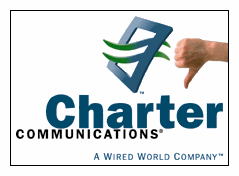 “Shareholders must be among the dumbest people in America to watch this company flush more than $30 million down Lovett’s bank account for two years and accomplishing the amazing task of actually making things worse,” Thom writes. “He’s proof that throwing money at a problem does not work, no matter how many press releases Charter puts out.”
“Shareholders must be among the dumbest people in America to watch this company flush more than $30 million down Lovett’s bank account for two years and accomplishing the amazing task of actually making things worse,” Thom writes. “He’s proof that throwing money at a problem does not work, no matter how many press releases Charter puts out.”

 Subscribe
Subscribe

